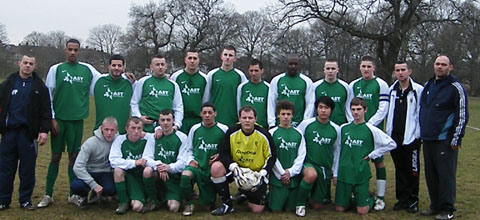Is racism a problem in South Wales’s lower league football?
Fifa president Sepp Blatter recently caused a storm of controversy by suggesting that racism on the pitch was nothing that could not be solved with a handshake at the final whistle.
In response to being asked whether he thought racism on the pitch was a problem, the 75-year-old told CNN, “There is no racism. There is maybe a gesture which is not the correct one. But the one who is affected, he should say: ‘This is a game. We are in a game, and at the end of the game, we shake hands.’ And this can happen, because we have worked so hard against racism and discrimination.”
One man’s stupidity aside, his comments, as well as the allegations of racist remarks surrounding John Terry and Luis Suarez, raise the issue of racism on the pitch. It is an issue which is not confined to the highest levels of football, but how prevalent is racism in grassroots Welsh football?
This summer, supporters of South Wales Amateur League side Graig FC, based in Pontypridd, were found guilty of shouting racist abuse during a match with STM Sports. The League authorities were praised by the Welsh press for fining the club £750 and for banning them from playing any home matches during October.
The vice-chairman of STM, Nigel Bircham, vehemently states that racism is rife in grassroots football. He has played, coached and refereed in Wales, and believes match officials are aware that abuse occurs in games. He states they would rather deny knowledge, because admitting it would result in a mountain of paperwork.
He also commented on Blatter’s remarks, “The bloke should’ve been sacked. The audacity to say it’s okay is unbelievable.”
Bircham says that abuse occurs regularly, sometimes in games at which the players’ family or friends are present. “That’s never pleasant”, he comments, “and sometimes the players or their family react.” At the Graig FC match the supporters began racist chants during the warm up, and went on into extra time. Eventually the players on the receiving end approached the crowd, and Bircham believes one was ready to react further before the situation was defused.
What the referee sees
However, the referees working in the South Wales area are confident that racism on the pitch is not a serious problem. Several have stated they have never heard any instances of such abuse in their games, in many years of refereeing in South Wales. One, who has refereed at various levels for 24 years, stated, “I have never witnessed any form of racism from players, or spectators, throughout my career.”
Terry Allday has not heard any racism on the pitch for at least fifteen years. Last season he was warned by one team that during the previous season’s fixture one of the opposition’s players had made racist remarks. Allday said there were none made in the game he refereed, and added, “If I recall, the person concerned was kicked out of the club”, and concluded on the subject of racism on the pitch, “possibly there could be incidents but certainly it’s not common.”
He revealed, “The South Wales Football Association hold a Referees Seminar every summer where referees are updated on issues – I cannot recall racism being a subject that is discussed so it is certainly not viewed as a major issue.”
Combatting racism on the pitch
Show Racism the Red Card (SRTRC), on the other hand, do believe that there is still a problem. Sunil Patel, campaign manager for SRTRC Wales, stated that they get many reports of incidents across Wales, but clubs and players are unwilling to report these to the authorities because they do not feel racism is taken seriously. He cites the example of Graig FC as evidence that when action is taken, it is far too little, saying, “More needs to be done to support victims, and harsher punishments need to be given out so that there is a real deterrent.”
After Christmas they plan to launch a new poster campaign, fronted by young Welsh talents Gareth Bale and Aaron Ramsey, designed to encourage referees and anyone else involved to report the incident immediately. It is hoped this will build trust in the relationship between players and the authorities, because currently there doesn’t seem to be any.
Racism, sadly, is still very much a part of life, and football is no different. For attitudes to change, says Sunil Patel, the people running the sport at all levels need to be educated. He points to Sepp Blatter as the perfect example; at the top of the sport are people who are old, out of touch, and who have no understanding of the problem of racism on the pitch because they have never experienced it. To see change, first we need to see a new generation take charge and take responsibility.

